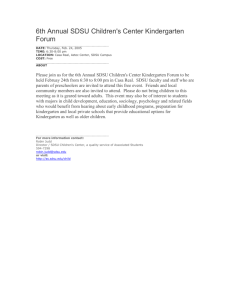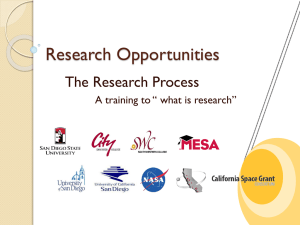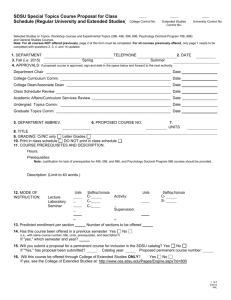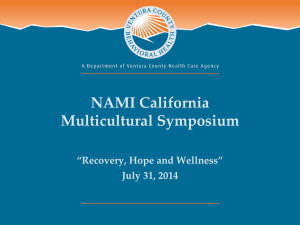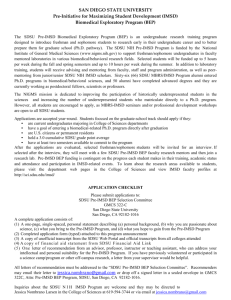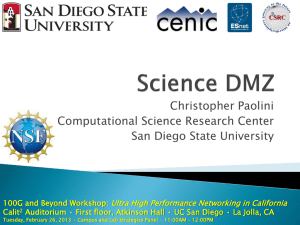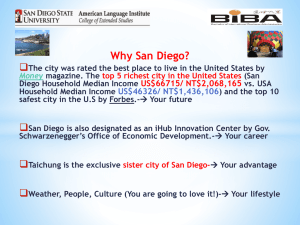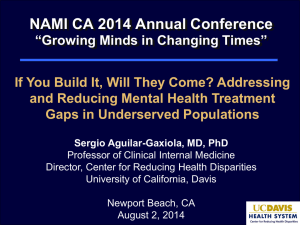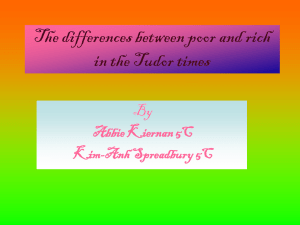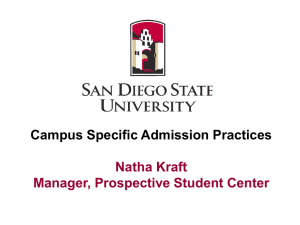Example of a Mentoring Program – Drs. John Elder and Greg Talavera
advertisement
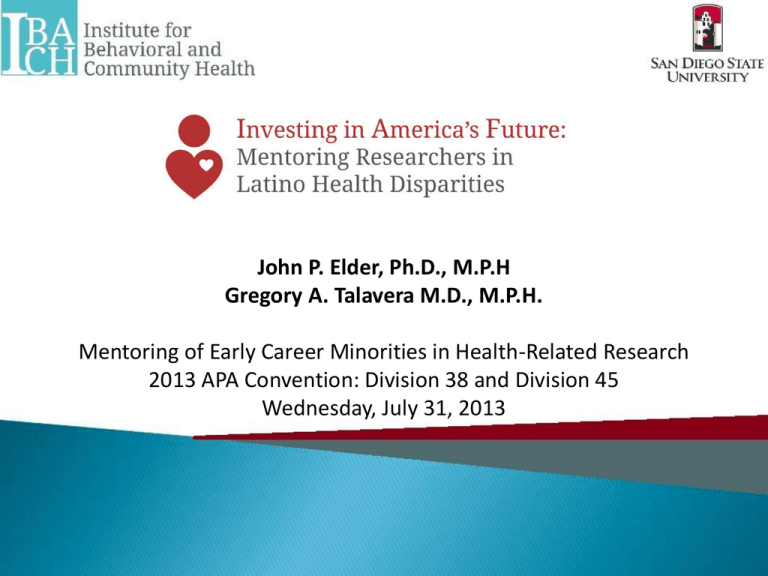
John P. Elder, Ph.D., M.P.H Gregory A. Talavera M.D., M.P.H. Mentoring of Early Career Minorities in Health-Related Research 2013 APA Convention: Division 38 and Division 45 Wednesday, July 31, 2013 “Leaking pipeline” • 2011 Ginther article finds that find that Asians are 4 percentage points and African-American applicants are 13 percentage points less likely to receive NIH investigator-initiated research funding compared with whites. African-American applicants remain 10 percentage points less likely than whites to be awarded NIH research funding.¹ • Latinos are losing ground in representation in academia: Latino citizens and residents comprise only 5% of doctorate recipients in 2006 compared to non-Latino whites at 76%.² • Low numbers of Latino faculty at colleges and universities, numbering only 4% in 2003, many of these in Spanish language departments.³ ¹ Race, Ethnicity, and NIH Research Awards Donna K. Ginther, Walter T. Schaffer, Joshua Schnell, Beth Masimore, Faye Liu, Laurel L. Haak, and Raynard Kington, Science 19 August 2011: 333 (6045), 1015-1019. [DOI:10.1126/science.1196783] ² Chapa, J, De La Rosa B. Latino population growth, socioeconomic and demographic characteristics, and implications for educational attainment. Education and Urban Society 2004; 26 (2): 130-149. ³ Digest of Education Statistics, 2004. National Center for Education Statistics. http://nces.ed.gov/programs/digest/d04/ Substantive action required • Eliminate career advancement disparities by increasing: – Amount of minorities receiving advanced degrees – Minorities with doctoral-level degrees that become productive faculty , especially in higher faculty ranks – Increase awards of federal research funds to minority applicants • Training of diverse and minority faculty in health professions, can ultimately result in: – “improving the quality of health care and accessibility of health services within culturally responsible populations”. ¹ ¹Fitz PA, Mitchell BE. Building Our Future – Increasing Diversity in the Diabetics Profession: A Summary of the ADA Diversity Mentoring Project. Journal of Allied Health 2002; 31: 177-183. • R25 “PRIDE” grant funded to conduct Summer Institute programs to enable faculty and scientists from minority groups to further develop their research skills and knowledge to enhance their career development – – – – – – Behavioral and Sleep Medicine: NYU Langone Medical Center Cardiovascular Genetic Epidemiology: Washington University in St. Louis Cardiovascular-Related Research: SUNY Downstate Medical Center Comparative Effectiveness Research: Columbia University School of Medicine Functional and Applied Genomics of Blood Disorders: Georgia Regents University Latino CVD Health Disparities: San Diego State University • San Diego State University Graduate School of Public Health (GSPH) and the Institute for Behavioral and Community Health (IBACH) awarded one of six mentoring programs • Principal Investigators: John P. Elder and Greg Talavera • Project funding period: 09/30/2010 – 09/29/2014 • Funding Source: National Heart, Lung, and Blood Institute (NHLBI) Mentoring Process • • 1 year tailored mentoring with program objectives for each mentee (Aug – July) – Pinpoint a focus area, develop research agenda, and determine academic plan and goals – Regularly scheduled meetings either in person, by phone or e-mail – Linkage with scientific expertise and role models Mentor site visit – Assigned mentor visits home university in following Spring • PRIDE Annual Meeting, Washington D.C. – Following Spring from Summer Institute allows mentees to network across PRIDE programs • Post-Institute training stipend – $1000 allocated for each mentee to pursue additional research Challenges • Thematic challenge for San Diego R25 PRIDE program has been whether to present an ethnic/Racial-specific or variable-specific theme. – We primarily emphasize the former in our summer institutes and this captures the professional ‘passion’ of the participants, but by doing so we have to present a very wide array of research topics, from biology to geography. • Demand for program exceeds program capacity – Increasing demand year after year 29 mentees 2011-’13 I. Ornelas M. Reyes S. Benavides-Vaello D. Lopez- Cevallos E. Grubert M. Jimenez J. Mattei L. Lopez B. Baquero A. Tovar P. Miranda C. Alcantara R. Pereira A. Guerrero Iana Castro B. Campos R. White III S. Vega L. Corsino D. Sotres- Alvarez K.D’Anna -Hernandez J. Ruiz P. Mora E. Sosa A. Rodriguez L. Ojeda R. Rosario-Rosado Pulgaron, Elizabeth Institute Curriculum Our Summer Institute consists of over 30 transdisciplinary trainings designed to enhance research skills in cardiovascular health disparities: Public Health: • • • • • • Public Health Research Framework: James Sallis – UCSD Community Based Participatory Research – Hector Balcazar, UTEP Behavioral Observation Lab – John Elder, SDSU GIS in Public Health Research – Ming Hsiang-Tsou, SDSU Correlations/ Determinants – Carmen Isasi, Albert Einstein College of Medicine Intervention Studies – John Elder, Elva Arredondo, SDSU & James Sallis Curriculum Latino Health Disparities: • • • • • • Latino Health Disparities – William Vega, USC Hispanic Community Health Study/Study of Latinos Data Set – Greg Talavera, Daniela Sotres Sociocultural Biobehavioral Factors in Hispanic/Latino Health – Linda Gallo, SDSU Redes en Acción & Salud America – Amelie Ramirez, UT Texas Science Center, San Antonio Promotoras Panel Acculturation Measures Panel Discussion – PI Panel Nutrition: • • • Grocery Store Audit – Guadalupe X. (Suchi) Ayala, SDSU Community Audits – Guadalupe X. (Suchi) Ayala, SDSU Nutrition Measurement – Ruth Patterson, UCSD Physical Activity: • • • Physical Activity Measures – Simon Marshall, UCSD SOFIT, SOPARC, SOPLAY – Thom McKenzie, SDSU Accelerometer Training – Simon Marshall, UCSD Grantwriting: • • • • • • • NHLBI Webinar: Grant Writing Seminar – Josephine Boyington, NHLBI Program Director Developing an Individual Academic Plan – Michaela Kiernan, Stanford University Scientific Writing Skills Workshop – Michaela Kiernan Editing in Motion – Michaela Kiernan Writing Grants That Get Funded: The Reviewer’s Perspective – Michaela Kiernan How to Respond to Grant Reviews – Michaela Kiernan Implementation Translation Dissemination – John Elder Grant Management: • • • Grant Management from a Program Manager Perspective – Program Manager Panel Grant Management from a PI Perspective - PI Panel Recruitment and Retention of Study Participants – Greg Talavera, SDSU Program Gains • During site visits, mentors advocate on mentee’s behalf • Research Networks develop within groups of ‘mentee’ participants. After two years many remain in close contact with one another. • Networks among faculty presenters from around the country also develop, linking us with other established senior researchers. THANK YOU!
